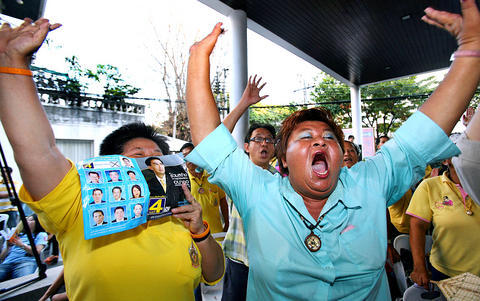Former Thai prime minister Thaksin Shinawatra, deposed, exiled and allegedly corrupt, was poised for a comeback-by-proxy as his allies won yesterday's post-coup election, exit polls showed.
The outcome is likely to deepen the country's two-year political crisis.
Polls from Thailand's two leading polling agencies, however, differed on whether the pro-Thaksin People's Power Party (PPP) had won an absolute majority in the 480-seat lower house of parliament.

PHOTO: AFP
With indications the PPP might fall short of the majority, its opponents could bring in partners to form a coalition government.
Thaksin was ousted in a bloodless coup in September last year, but retains widespread popularity among the rural majority. PPP campaigned on a platform of bringing Thaksin back from exile in London and continuing his populist policies.
Unofficial results were expected before midnight yesterday in an election billed as a return to democracy after 15 months of military-backed government.
The state-owned broadcaster MCOT reported the PPP had won 227 seats while its rival Democrat Party took 158 after tallying 75 percent of the votes at polling stations nationwide.
A Dusit poll for Bangkok's Suan Dusit Rajabhat University forecast the PPP had won a majority with 256 seats, compared to 162 for the rival Democrat Party.
An Abac poll for Assumption University, which was more in line with several pre-election predictions by analysts, showed PPP had won 202 seats, falling short of an outright majority, with the Democrats taking 146 seats.
The Dusit poll surveyed 341,000 voters nationwide before polling stations closed at 3pm. It had a margin of error of plus or minus 5 percentage points. Abac surveyed 500,000 voters and the poll had a margin of error of plus or minus 4.1 percentage points.
"I saw the polls. We are not surprised. From what we surveyed two weeks ago and the polls that came out before, we will have more than 240," PPP secretary-general Surapong Suebwonglee said.
He said the party would try to control more than 300 seats by attracting coalition partners.
Voters among the 45 million eligible cast ballots for about 5,000 candidates from 39 political parties.
The contest pitted the PPP, seen as a reincarnation of Thaksin's outlawed Thai Rak Thai Party, against the Democrat Party, the country's oldest.
PPP leaders said Thaksin, who was watching the election from Hong Kong, would return to Thailand early next year, sparking fears of continued political turbulence.

MORE VISITORS: The Tourism Administration said that it is seeing positive prospects in its efforts to expand the tourism market in North America and Europe Taiwan has been ranked as the cheapest place in the world to travel to this year, based on a list recommended by NerdWallet. The San Francisco-based personal finance company said that Taiwan topped the list of 16 nations it chose for budget travelers because US tourists do not need visas and travelers can easily have a good meal for less than US$10. A bus ride in Taipei costs just under US$0.50, while subway rides start at US$0.60, the firm said, adding that public transportation in Taiwan is easy to navigate. The firm also called Taiwan a “food lover’s paradise,” citing inexpensive breakfast stalls

TRADE: A mandatory declaration of origin for manufactured goods bound for the US is to take effect on May 7 to block China from exploiting Taiwan’s trade channels All products manufactured in Taiwan and exported to the US must include a signed declaration of origin starting on May 7, the Bureau of Foreign Trade announced yesterday. US President Donald Trump on April 2 imposed a 32 percent tariff on imports from Taiwan, but one week later announced a 90-day pause on its implementation. However, a universal 10 percent tariff was immediately applied to most imports from around the world. On April 12, the Trump administration further exempted computers, smartphones and semiconductors from the new tariffs. In response, President William Lai’s (賴清德) administration has introduced a series of countermeasures to support affected

CROSS-STRAIT: The vast majority of Taiwanese support maintaining the ‘status quo,’ while concern is rising about Beijing’s influence operations More than eight out of 10 Taiwanese reject Beijing’s “one country, two systems” framework for cross-strait relations, according to a survey released by the Mainland Affairs Council (MAC) on Thursday. The MAC’s latest quarterly survey found that 84.4 percent of respondents opposed Beijing’s “one country, two systems” formula for handling cross-strait relations — a figure consistent with past polling. Over the past three years, opposition to the framework has remained high, ranging from a low of 83.6 percent in April 2023 to a peak of 89.6 percent in April last year. In the most recent poll, 82.5 percent also rejected China’s

PLUGGING HOLES: The amendments would bring the legislation in line with systems found in other countries such as Japan and the US, Legislator Chen Kuan-ting said Democratic Progressive Party (DPP) Legislator Chen Kuan-ting (陳冠廷) has proposed amending national security legislation amid a spate of espionage cases. Potential gaps in security vetting procedures for personnel with access to sensitive information prompted him to propose the amendments, which would introduce changes to Article 14 of the Classified National Security Information Protection Act (國家機密保護法), Chen said yesterday. The proposal, which aims to enhance interagency vetting procedures and reduce the risk of classified information leaks, would establish a comprehensive security clearance system in Taiwan, he said. The amendment would require character and loyalty checks for civil servants and intelligence personnel prior to